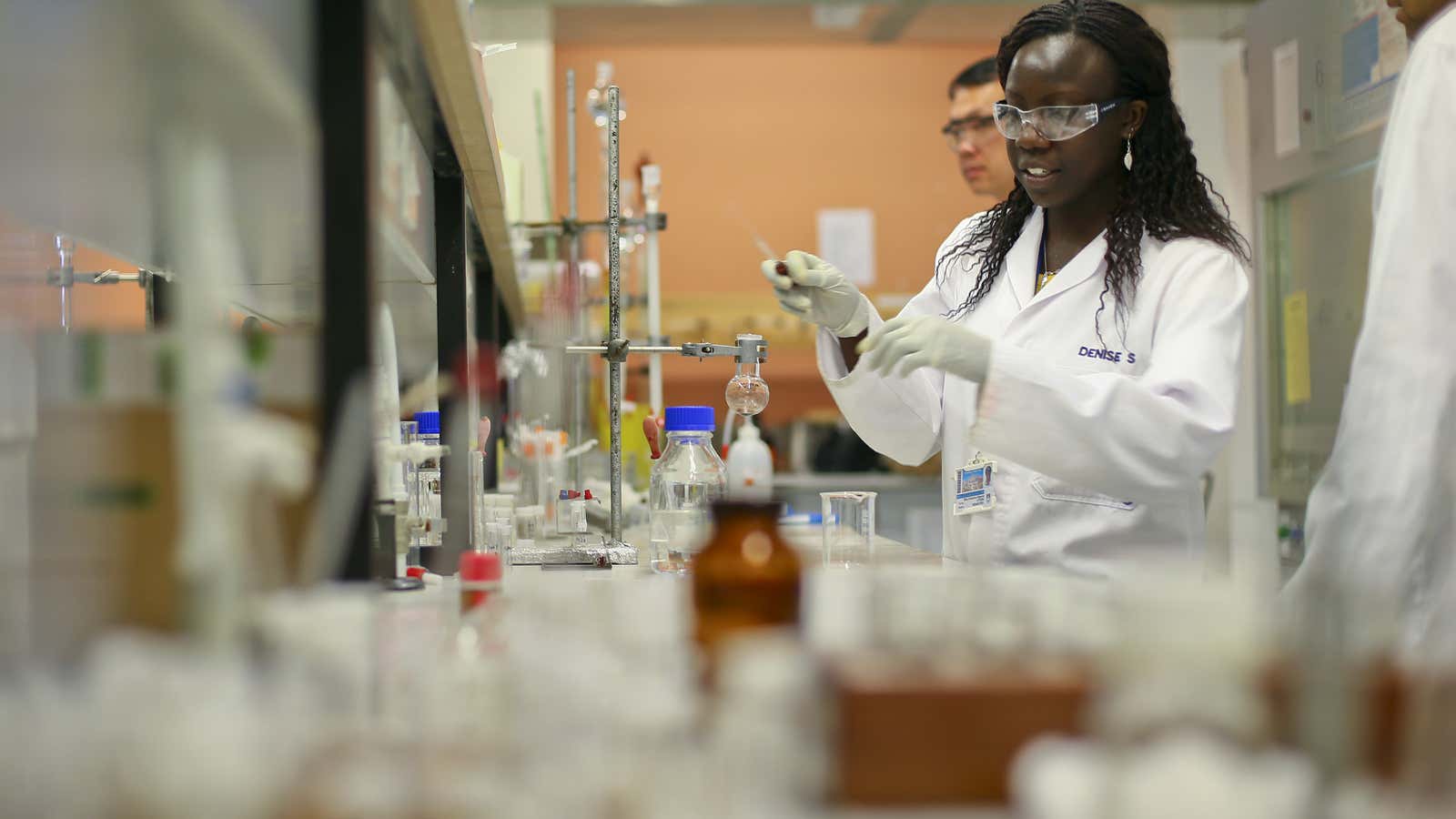Low levels of investment in science, technology, engineering and mathematics (STEM) education have the potential to gravely affect Africa’s growth, impeding the competitiveness of many of its nations on a global scale. It is time for a wake-up call.
There are signs the continent is thriving economically. But is it sustainable without a workforce that will build the foundation for long-term growth? It has been argued that the most important determinant of economic growth is the “knowledge capital” of nations, which is defined as the aggregate skills of the country’s population and which is measured by achievement scores on international mathematics and science examinations. Achieving the goals for education will provide the resources to reduce poverty, to improve health, and to reach inclusive growth that lessens inequality within and between countries.
According to UNESCO, in 2015, Africa needed to produce 2.5 million new engineers and technicians to be able to meet the Millennium Development Goals (MDGs). However, there are more African engineers working in the US than on the African continent. Similarly, in 2009, Africa had fewer than 2,000 PhD holders in mathematical sciences. The UK economy is heavily dependent on the use of mathematical sciences in its financial sector. The same can be said for most advanced and emerging economies. What about Africa’s countries? Unless drastic steps are taken by all stakeholders, including the private and public sector, Africa’s positive trajectory of growth may come to a grinding halt.
Sustaining Africa’s positive outlook
Western nations have understood the link between investment in research, particularly STEM, and financial prowess. This year, the US will invest $146 billion in research and development as part of its innovation strategy. In 2009, the US Department of Labour announced that 8 of 10 high-demand careers needed STEM-related degrees. Today, 70% of jobs outsourced from the US are in STEM-related fields. In Asia, Thailand, Malaysia and Indonesia are funneling aid to R&D. Africa still has a long way to go. Yet, the continent is in dire need of STEM professionals who will find solutions to challenges in infrastructure, energy, health, food security, amongst other things.
How do we get there when Africa loses $4 billion in outsourcing STEM-related services to expatriates (data from two decades ago, yet, not much has changed)? In 2014, the World Bank released a report that assessed progress in global research output. Africa produces less than 1% of global output. I strongly believe that there is a direct link between these figures and the fact that no African country is spending more than 1% of its GDP on research and development (R&D).
South Africa, the most advanced country in terms of research in Africa, plans to get there by 2020. Africa is also invisible on the global research and innovation stage. And yet, African scientists are working on important, life-saving, globally relevant research and innovations. Most of them are just not doing it on the continent given the many challenges they face, including a lack of adequate infrastructure for scientific research.
The next Einstein will be African
There is no doubt in my mind that the next Einstein will be from Africa. Mathematically, given the continent’s population levels, it is a probability. In less than 35 years, two of five children will be African according to the UN. How do we harness their talent? What reforms are required in the education system? How do we create a synergy between academia, policy and industry for society’s benefit? If Africa tackles these questions honestly and makes the right investments in its youth, the emergence of an African Einstein is a certainty.
The African Institute for Mathematical Sciences (AIMS) works with an innovative learning model that teaches our masters’ students how to use mathematical modelling to problem-solve across sectors. In order to promote brain circulation, and together with our partners, we have launched research chairs to bring back Africa’s most talented researchers to work at one of our five centres of excellence across Africa. To increase the number of students, particularly girls, going into and staying in STEM fields, we launched a gender responsive mathematics teacher training program in Cameroon which will be expanded to Rwanda this year.
In 2013, we launched the Next Einstein Forum (NEF). How best to counter Africa’s invisibility on the global scientific stage than by bringing the world to Africa? We hope to make the NEF a place for forging global networks and facilitating investment and collaboration between the world and Africa in science and technology. Africa is perceived at best as the small entrepreneur, “start-up” continent. No one speaks about the researchers working on Ebola or Zika or on solving 70 year-old immunological puzzles. Much less is said about our quantum physicists or cosmologists.
There are many successful models that are taking shape in Africa, and it is important to come that academia, government, private sector and civil society come together to discuss a way forward. The fourth industrial revolution is upon us, and Africa can take the lead. We have the demographic advantage, and our leaders and citizens are hungry for solutions. Now, it is time for concrete and collaborative action to move beyond potential.
Thierry Zomahoun is President and CEO of the African Institute for Mathematical Sciences and Chair of the Next Einstein Forum.
